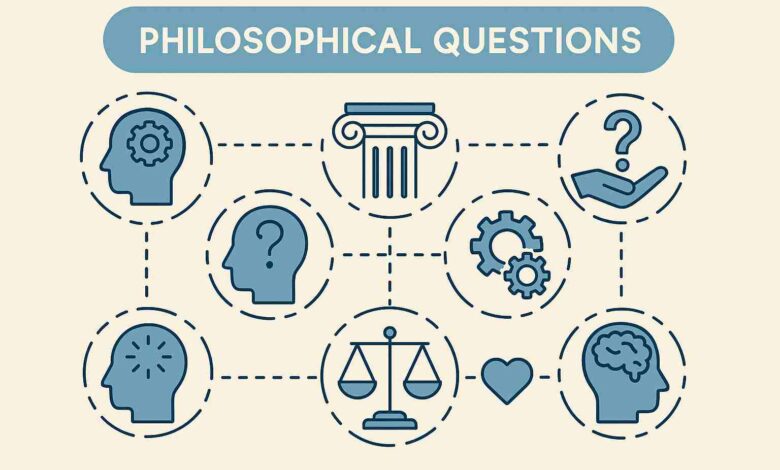Philosophical Question: Unlocking the Mysteries of Life and Thought
Exploring Ideas That Shape Our World and Challenge Our Minds

Introduction
A philosophical question is more than just a simple inquiry—it is a doorway into the deepest realms of thought and understanding. These questions have shaped civilizations, inspired revolutions, and fueled the development of sciences, religions, and cultures. From metaphysics to ethics, philosophy deals with concepts that go beyond everyday facts and delve into the very meaning of life and reality.
In today’s world, philosophical questions are as relevant as ever. Whether we are debating free will, questioning the mind-body problem, or exploring the nature of consciousness, these questions push us to think critically. Even at institutions like London South Bank University, students and scholars engage in philosophical discussions that influence decision-making, leadership, and personal growth.
What is a Philosophical Question
A philosophical question is a type of question that seeks answers beyond empirical evidence. Unlike scientific questions, which are resolved through experimentation and observation, philosophical questions require deep abstract thinking and logical reasoning.
These questions challenge our assumptions and force us to explore ideas that may not have definitive answers. For example, “What is truth?” or “Does free will truly exist?” are philosophical questions because they invite multiple perspectives and interpretations. They are timeless and universal, appealing to anyone who seeks wisdom and understanding.
Types / Domains of Philosophical Questions
Philosophy covers a wide range of domains, each focusing on a specific area of inquiry. Below are some key branches:
Metaphysics and Ontology
Metaphysics deals with the fundamental nature of reality and existence. It asks questions like, “Why does anything exist at all?” or “What is the nature of time and space?” Ontology, a subset of metaphysics, specifically examines what kinds of things exist and how they are categorized.
Epistemology
Epistemology is the study of knowledge. It explores how we know what we claim to know. Questions such as “What is truth?” or “Can we trust our senses?” are core to this branch of philosophy.
Ethics and Moral Philosophy
Ethics deals with what is right and wrong. It forms the basis of moral systems and societal rules. Philosophers debate topics like whether morality is absolute or relative and how humans should act in difficult situations.
Aesthetics
Aesthetics examines beauty, art, and taste. Questions like “What makes something beautiful?” or “Can art have objective value?” belong to this domain.
Political Philosophy
This area studies justice, governance, and the role of the state. It deals with concepts like equality, rights, and freedom.
Philosophy of Language and Logic
The philosophy of language focuses on meaning and communication, while logic studies correct reasoning and argumentation.
Philosophy of Religion
This branch explores questions about the divine, faith, and spirituality, including the existence of God and the problem of evil.
Classic / Important Philosophical Questions & Problems
Certain philosophical questions have been debated for centuries because of their complexity and impact:
The Problem of Evil
How can evil exist in a world created by an all-powerful, all-good being? This question challenges both theology and philosophy of religion.
The Mind-Body Problem
Is the mind purely a product of the physical brain, or is it something separate? This problem lies at the heart of consciousness studies and modern neuroscience.
Free Will vs Determinism
Do humans truly have free will, or are our choices determined by factors beyond our control? This question influences moral philosophy and legal systems.
The Nature of Reality
Metaphysical questions like “Is the universe real or an illusion?” continue to fascinate thinkers and scientists alike.
These timeless problems keep philosophy relevant, sparking debates that evolve as our understanding grows.
What Makes These Questions Hard / Philosophically Interesting
Philosophical questions are difficult because they often lack definitive answers. Unlike mathematics or science, which can provide exact solutions, philosophy deals with ambiguity.
They are interesting because they require critical thinking and creativity. These questions often involve conflicting perspectives, challenging individuals to consider multiple possibilities. For example, debates about existentialism explore whether life has inherent meaning or whether humans create their own purpose.
Why Philosophical Questions Matter
Philosophy shapes the way we think, act, and understand the world. It builds a foundation for other disciplines like science, politics, and art.
By engaging with philosophical questions, we develop essential skills such as reasoning, analysis, and problem-solving. In educational institutions like London South Bank University, philosophy is integrated into various fields to help students become leaders and innovators.
Philosophical inquiry also has practical implications. Ethical debates influence medical decisions, environmental policies, and global justice. Understanding political philosophy, for instance, can lead to more informed civic participation.
Current Trends & Debates
Modern philosophy engages with contemporary issues that affect everyday life.
Artificial Intelligence and Consciousness
As technology advances, philosophers ask whether machines can possess consciousness or moral responsibility.
Global Ethics
Questions about climate change, poverty, and human rights require ethical frameworks to address complex global challenges.
Cultural and Social Philosophy
Debates about identity, diversity, and equity are becoming central to philosophical discussions worldwide.
Philosophy continues to evolve, adapting to the needs and problems of modern society.
Quick Fact of Philosophy
| Field | Description |
|---|---|
| Origin | Ancient Greece, 6th century BCE |
| Major Branches | Metaphysics, Epistemology, Ethics, Logic, Aesthetics |
| Key Philosophers | Socrates, Plato, Aristotle, Descartes, Kant |
| Modern Applications | AI ethics, political theory, education, psychology |
Conclusion
Philosophical questions are vital for understanding ourselves and the world. They challenge us to think deeply, embrace complexity, and seek truth beyond surface appearances.
In a world driven by technology and rapid change, the timeless discipline of philosophy remains a guiding light. Whether exploring free will, ethics, or consciousness, engaging with these questions builds a foundation for personal growth and collective progress.
FAQs
What is the purpose of philosophical questions?
The purpose is to challenge assumptions, explore abstract ideas, and deepen our understanding of reality, knowledge, and morality.
How are philosophical questions different from scientific questions?
Scientific questions rely on empirical evidence, while philosophical questions focus on reasoning, logic, and conceptual clarity.
Can philosophical questions be answered definitively?
Some questions may have widely accepted answers, but most remain open to debate, encouraging ongoing discussion and exploration.
Why should students study philosophy?
Studying philosophy improves critical thinking, communication, and problem-solving skills, making it valuable for careers in law, politics, education, and more.
What role does philosophy play in modern society?
Philosophy influences ethics, politics, and technology, helping society navigate complex moral and social issues.




